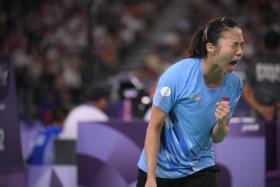SportSG wants NSAs to do more for safety
National sports governing body's safety committee convenes inquiry to look into case of delayed medical attention for hockey player who suffered stroke
The spotlight has been thrust on safety in local sports, following The New Paper's report on hockey player Siti Nur Raihanah Waled, who suffered a stroke during a National Women's League match on June 2.
Miss Delphine Fong, sports safety director at the national sports governing body Sport Singapore (SportSG), told TNP yesterday that national sports associations (NSAs) should assess the risks for their respective sports.
She said: "The environment is different for each sport and the level of the athletes differ for the leagues... If we become prescriptive, it becomes challenging. SportSG can't know all the rules and regulations of each and every sport. The best people are those who are managing the specific sport."
SportSG has also briefed all NSAs on the latest edition of the Sports Safety Committee Report released in March. The manual categorises sports according to the level of risk and recommends levels of medical support needed at these events.
When Miss Raihanah collapsed during the game at the Sengkang Hockey Stadium, at least an hour passed before an ambulance was called. TNP has learnt the SportSG safety committee has convened an official inquiry to look into the matter.
When asked if SportSG plans to make it mandatory for NSAs to adopt certain recommendations, Ms Fong said: "It is not for us to prescribe, so it is important that they consult their own management committee and stakeholders to decide what they want in place."
As reported last week, some NSAs, including the Singapore Hockey Federation (SHF), noted that cost was a factor when it came to having medical personnel on standby.
After Miss Raihanah's injury, the SHF said it will deploy ambulances for the remainder of its league matches this season.
Checks by TNP showed that a medic at a local event can cost between $30 and $50 an hour.
An industry expert told TNP: "Some NSAs compromise on safety in the name of cost. Sports safety should be part of the plan from the start and they should know the overall cost and work on getting funds for that."
Former Singapore footballer R. Sasikumar, who runs sports marketing agency Red Card Global, agreed.
"The problem in Singapore is that a lot of these NSAs are run by people who see the sport as merely an interest or hobby," said Mr Sasikumar. "(In other countries), the sports associations are independent and don't depend on handouts. In Singapore, we have not evolved."
On whether funding would be a problem for NSAs when it comes to providing basic medical services at matches, Mr Sasikumar said: "It's simple. If you can't afford something as basic as having a medical professional during league games, then you shouldn't run them."
Get The New Paper on your phone with the free TNP app. Download from the Apple App Store or Google Play Store now


